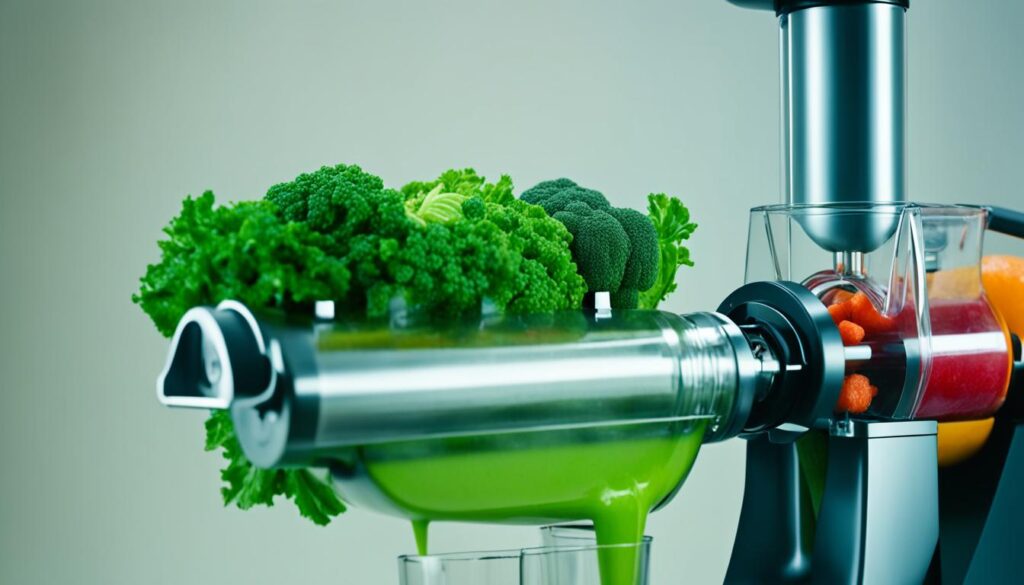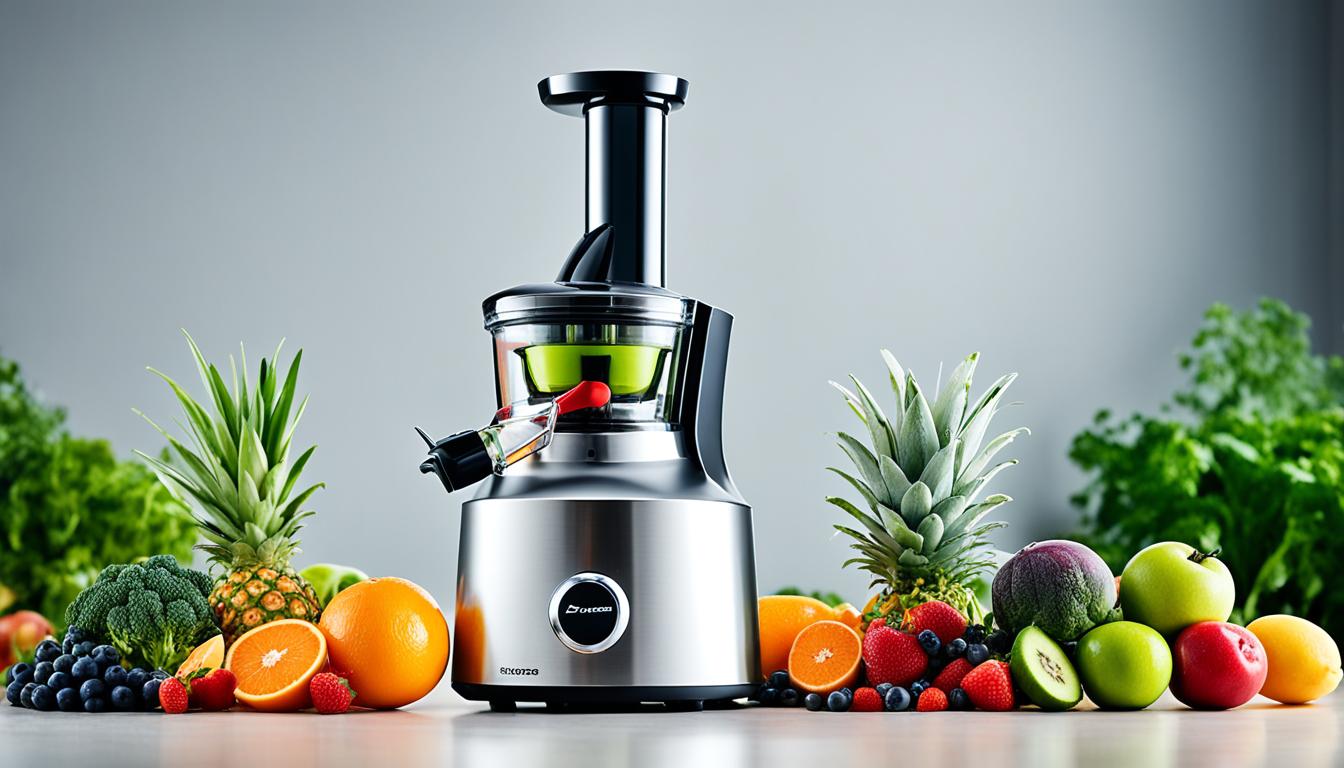Are you wondering which type of juicer is the best choice for you? Centrifugal or masticating? It’s a common dilemma faced by anyone looking to upgrade their juicing game. But fear not! In this article, we’ve got you covered with an in-depth comparison of centrifugal and masticating juicers. No more confusion, just clarity.
When it comes to juicing, the type of juicer you choose can make a significant difference in taste, nutrient content, and overall juicing experience. But with so many options out there, it can be challenging to determine which one is right for you. That’s why we’ve created this juicer comparison guide to help you make an informed decision. So, let’s dive into the world of centrifugal and masticating juicers and find out which one reigns supreme!
Key Takeaways:
- Centrifugal juicers operate at high speeds and are ideal for juicing hard fruits and vegetables.
- Masticating juicers work at slower speeds, preserving more nutrients and handling a wider range of produce.
- Centrifugal juicers are faster and more affordable, while masticating juicers offer superior juice quality.
- Consider your specific needs, budget, and preferred juicing ingredients when choosing the best juicer for you.
- Weigh the pros and cons of each type to make an informed decision that aligns with your healthful lifestyle.
Understanding Centrifugal Juicers
Centrifugal juicers, also known as high-speed juicers, operate at impressive speeds ranging from 6,000 to 14,000 RPM. These juicers utilize a cutting disc to shred and tear ingredients, extracting juice through the power of centrifugal force. The juice is then separated from the pulp using a fine mesh filter.
Centrifugal juicers are widely recognized for their fast operation, making them perfect for juicing hard fruits and vegetables such as carrots and apples. Their high-speed spinning allows for quick juice extraction, resulting in a time-efficient juicing process.
However, it’s crucial to note that the rapid spinning action of centrifugal juicers can introduce heat and oxygen to the juice. This exposure may potentially degrade the quality of the nutrients present in the juice.
Image: A centrifugal juicer in action, showcasing its high-speed operation.
Understanding Masticating Juicers
Masticating juicers, also known as slow juicers, operate at a much slower speed compared to centrifugal juicers. With speeds typically ranging from 40 to 100 RPM, these juicers use a chewing or pressing action to extract juice from fruits and vegetables. This slower process leads to higher nutrient retention and a higher juice yield.
One of the main advantages of masticating juicers is their ability to efficiently juice leafy greens. The slow and thorough extraction process ensures that every drop of juice is extracted from the produce, resulting in a higher yield of nutrient-rich juice.
Masticating juicers are also known for producing juice of exceptional quality. The slow extraction process minimizes heat and oxidation, preserving the integrity of the nutrients and enzymes in the juice. The juice produced by masticating juicers has less foam and a thicker consistency, which is preferred by many juice enthusiasts.
While masticating juicers are generally slower and more expensive than centrifugal juicers, they offer significant benefits in terms of juice quality and nutrient preservation. With their ability to juice a wider variety of fruits and vegetables, as well as their superior performance with leafy greens, masticating juicers are a popular choice for those seeking the highest quality juice.

If you’re looking to maximize the nutrient content of your juices and enjoy a higher juice yield, a masticating juicer is the ideal choice. Its slow and thorough extraction process ensures that you get the most out of your fruits and vegetables. While it may require a bit more time and investment, the superior juice quality and nutrient retention make it well worth it.
Choosing the Best Juicer for You
When selecting a juicer, it’s important to consider your specific needs and lifestyle. Centrifugal juicers and masticating juicers each have their own unique benefits and drawbacks. Let’s compare the pros and cons of each type to help you make an informed decision.
Centrifugal Juicers
Centrifugal juicers are known for their speed and affordability. They work by spinning at high speeds, extracting juice from fruits and vegetables through centrifugal force. Here are the key advantages and disadvantages of centrifugal juicers:
- Pros of Centrifugal Juicers:
- Fast juicing process, perfect for those with limited time
- More affordable compared to masticating juicers
- Efficient at juicing hard fruits and vegetables
- Cons of Centrifugal Juicers:
- May not perform as well with leafy greens
- Higher heat and oxygen exposure may affect juice quality
Masticating Juicers
Masticating juicers, also known as slow juicers, operate at a slower speed and use a chewing or pressing action to extract juice. They offer several benefits that make them a popular choice among juicing enthusiasts:
- Pros of Masticating Juicers:
- Superior juice quality and nutrient preservation
- Quieter operation
- Can handle a wider range of produce, including leafy greens
- Cons of Masticating Juicers:
- More expensive compared to centrifugal juicers
- Require more time for juicing and cleaning
Now that you’re aware of the pros and cons of each type, consider your priorities and preferences. If speed and affordability are your main concerns, a centrifugal juicer may be the best option for you. On the other hand, if juice quality and versatility are important, investing in a masticating juicer is worth considering.
Remember to keep in mind the types of produce you’ll be juicing, your budget, and the amount of time you’re willing to spend on juicing and cleaning. By taking all these factors into account, you’ll be able to find the best juicer that suits your needs and enhances your healthy lifestyle.
Conclusion
In conclusion, when it comes to choosing between centrifugal and masticating juicers, it ultimately boils down to your specific preferences and needs. If speed and affordability are your top priorities, a centrifugal juicer is a great option. It operates at high speeds, making quick work of hard fruits and vegetables like carrots and apples. However, it’s worth considering that centrifugal juicers may introduce heat and oxygen to the juice, potentially affecting the quality of nutrients.
On the other hand, if you prioritize juice quality, nutrient retention, and versatility, investing in a masticating juicer is a wise choice. Though they operate at a slower speed, masticating juicers extract juice through a chewing or pressing action, resulting in higher nutrient preservation. They are also highly efficient in juicing leafy greens and can handle a wide range of produce. While masticating juicers require more time and money, they offer superior juice quality and enhanced health benefits.
When making a decision, consider the types of produce you’ll be juicing, your budget, and the time you’re willing to spend on juicing and cleaning. By carefully weighing these factors and comparing the pros and cons of each juicer type, you can make an informed choice and find the best juicer for your healthful lifestyle. So whether you’re looking to enjoy a refreshing green juice or kickstart your mornings with a burst of vitamins, selecting the right juicer will be the first step on your journey to a healthier you.
